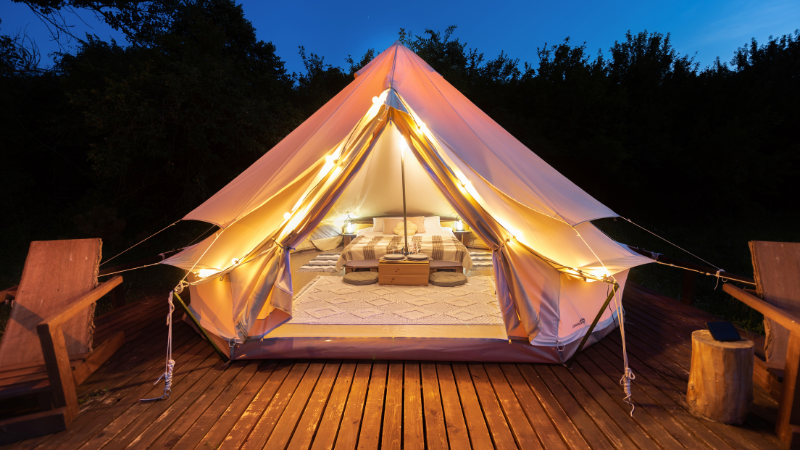The rise of luxury outdoor accommodation is transforming tourism and hospitality. Many entrepreneurs are now exploring glamping tents for sale as a gateway into a profitable business model that blends nature with comfort. Unlike traditional camping, glamping delivers a stylish, high-end experience that attracts families, couples, and even corporate groups.
Why Glamping Is Growing Rapidly
Modern travellers want unique experiences, not just hotel rooms. They are increasingly drawn to the idea of being close to nature while still enjoying comfortable beds, heating, private bathrooms, and chic interiors. Luxury tents meet this demand perfectly.
The glamping industry benefits from global lifestyle changes where wellness, eco-tourism, and sustainable travel are in demand. Guests are happy to pay premium rates for memorable stays, which creates high profit margins for businesses investing in glamping sites.
Types of Business Models with Glamping Tents
Glamping is flexible, offering opportunities for small start-ups as well as larger enterprises. Business models vary from operating a dedicated glamping site to partnering with existing resorts, farms, or event venues.
Luxury tents can also be used for seasonal pop-up stays, wellness retreats, music festivals, or destination weddings. Because they are portable, the business is not restricted to one location, and operators can experiment with different markets before committing to permanent infrastructure.
Profit Potential of Luxury Tents
The appeal of luxury tents lies in their ability to command higher prices than traditional camping. While standard campsites charge modest fees, glamping guests often pay hotel-level rates for a night under the stars with added amenities.
Operating costs are lower than building permanent structures, as tents require less land development, fewer construction permits, and reduced maintenance. Once established, the return on investment can be significant, especially in high-demand tourist regions.
Who Is the Target Market?
Understanding the customer base is key to success. Couples looking for romantic getaways, families seeking unique holidays, and millennials searching for Instagram-worthy experiences all make up a strong target audience.
In addition, corporate retreats and team-building groups represent a growing market. Businesses prefer glamping because it offers both relaxation and outdoor activities, creating a balanced environment for productivity and bonding.
Added Value Services for Higher Revenue
Profitability is not limited to tent bookings alone. Successful glamping operators often include extras that enhance the guest experience. These can range from guided hikes and outdoor yoga sessions to farm-to-table dining or live music events.
Additional services such as catering, transport packages, or wellness treatments can increase overall revenue. By focusing on creating a complete experience rather than simply offering accommodation, businesses can differentiate themselves in a competitive market.
Investment Considerations
Before launching, there are a few practical aspects to consider. Location plays a crucial role, as scenic backdrops like forests, lakesides, or coastal regions enhance the appeal. Climate must also be factored in, as insulation, heating, or cooling can be required depending on the destination.
Start-up costs vary depending on the size and quality of tents, furnishings, and land arrangements. Entrepreneurs should also account for marketing expenses to attract guests, as online visibility and social media presence are vital in this niche.
Sustainability as a Selling Point
Another advantage of luxury tents is their alignment with eco-friendly tourism. Many travellers prefer businesses that minimise environmental impact. Tents can be set up with solar panels, compost toilets, and rainwater harvesting, which reduces running costs while appealing to environmentally conscious guests.
Highlighting sustainability not only attracts more customers but also creates long-term trust and loyalty.
The Future of Glamping Businesses
The future looks promising as the glamping industry is expected to keep expanding. Trends suggest demand will rise for wellness-focused retreats, adventure packages, and personalised luxury escapes. Entrepreneurs entering this market now are well positioned to take advantage of continued growth.
With relatively low entry barriers compared to building hotels, the business case for glamping is strong. By investing in luxury tents, entrepreneurs can diversify their portfolio and tap into the lucrative experience-driven tourism sector.
Conclusion
Glamping is not just a passing travel trend—it is becoming a mainstream part of the hospitality industry. Luxury tents provide the balance of comfort and nature that modern travellers crave, while offering entrepreneurs flexible and profitable business opportunities.
By targeting the right market, creating unique guest experiences, and highlighting eco-friendly practices, businesses can maximise returns. For those considering an entry into hospitality or tourism, investing in glamping tents could be the start of a highly rewarding venture.

